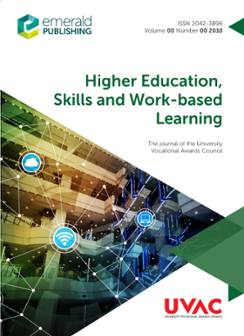Higher Education, Skills and Work-Based Learning: Volume 12 Issue 2
Strapline:
The journal of the University Vocational Awards CouncilTable of contents
Influences on the career intentions of millennials; a view from the United Arab Emirates
Linzi J. Kemp, Linda McLoughlinThe study aims to discover influences on the career intentions of millennials in the United Arab Emirates (UAE).
Building a digital marketing internship program for technology-based start-ups: an exploratory study of student experiences
G. Russell Merz, Jamie Ward, Sufian Qrunfleh, Bud GibsonThe purpose of this paper is to describe the role and characteristics of the summer internship program (Digital Summer Clinic) delivered by Eastern Michigan University. The…
Automation in Colombia: assessing skills needed for the future of work
Michael Jones, Sandra Idrovo-Carlier, Alfredo J. RodriguezThe purpose of this paper is to identify workforce skills that protect an occupation from elimination due to automation technology.
An experiential learning-integrated framework to improve problem-solving skills of engineering graduates
Kuldip Singh Sangwan, Rajni SinghProblem solving skills (PSS), an important component of learning outcomes, is one of the desirable skills in engineering graduates as stated by many employers, researchers and…
Exploring the communication skills of Indian engineering undergraduates: a partial ethnographic study
Urvashi Kaushal, Toran TalwarEngineers graduating from premier institutions of India look for global opportunities that will provide a chance to work with the best and the most innovative minds in the world…
Knowledge mapping of skills mismatch phenomenon: a scientometric analysis
Zineb Draissi, Qi Zhanyong, Princess Zarla Jurado RaguindinThis paper aims to understand the development track of skills mismatch research and discover the hidden internal connections between literature.
Information security education based on job profiles and the e-CF
Marcel SpruitThe information security field requires standardised education. This could be based on generic job profiles and a standard competence framework. The question is whether this is…
Partnership with stakeholders as innovative model of work-integrated learning for unemployed youths
Celestin MayombeThe unemployment rate among disadvantaged youths (aged 15–34 years) in large parts of Africa, Asia and Latin America has become a global concern. The concern in this article is…
Promoting entrepreneurship based on university students' perceptions of entrepreneurial attitude, university environment, entrepreneurial culture and entrepreneurial training
Alejandro Valencia-Arias, Diana Arango-Botero, Javier A. Sánchez-TorresThe purpose of this study is to verify some relationships between entrepreneurial attitude, university environment, entrepreneurial culture and entrepreneurial training, which can…
Stepping up the game–meeting the needs of global business through virtual team projects
Stephanie Swartz, Archana ShrivastavaVirtual collaboration provides students with an opportunity to develop cultural intelligence while fitting into the team where the members are from diverse cultures. The purpose…
Ethical education and its impact on the perceived development of social entrepreneurship competency
José Carlos Vázquez-Parra, Abel García-González, María Soledad Ramírez-MontoyaThe aim of this paper is to discuss the importance of multidisciplinary training in the perceived development of social entrepreneurship competence. By means of a sample of an…
Is it all about perception? A sustainability viewpoint on psychological capital and life well-being of management graduates
Nimmi P. M, George Joseph, William E. DonaldWell-being and employability are considered important indicators of a sustainable career that must be incorporated into the system at the beginning of a job. Hence, it is…

ISSN:
2042-3896Online date, start – end:
2011Copyright Holder:
Emerald Publishing LimitedOpen Access:
hybridEditor:
- Prof Tony Wall